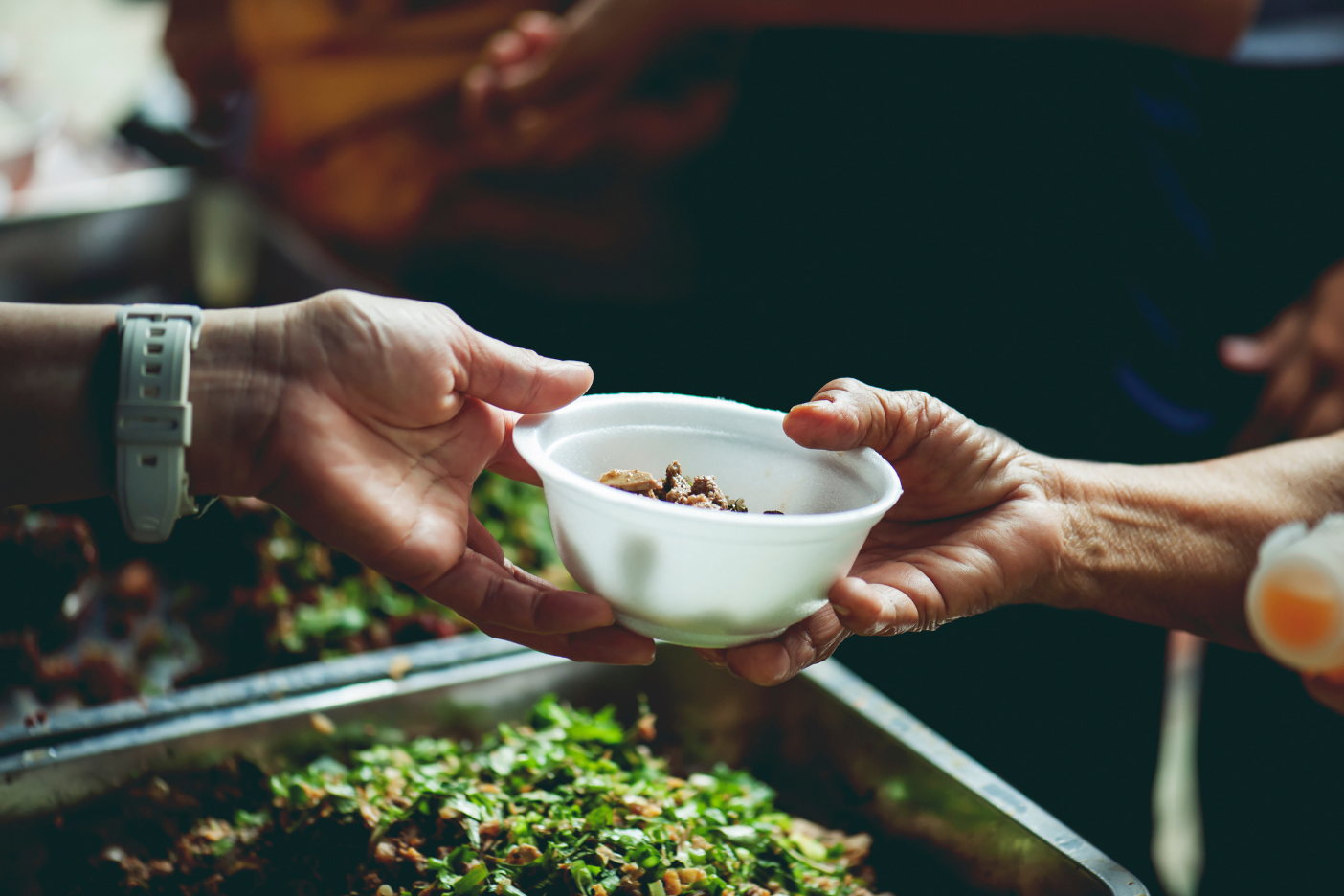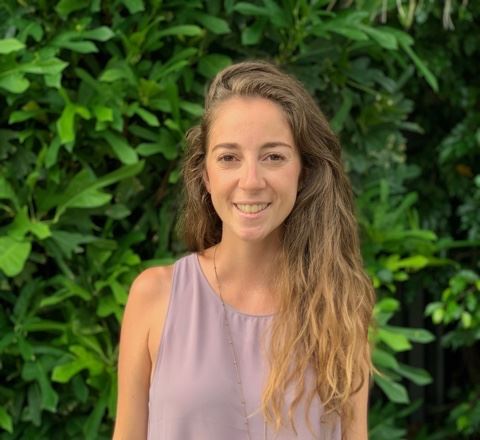
Follow Up: March Florida Food Forum
Food is Not a Human Right: Issues in Food Democracy
If you were unable to attend the meeting, watch the full presentation online here.
To keep the conversation going, please visit our forum on Food is Not a Human Right: Issues in Food Democracy to add your thoughts and comments.
On Friday, March 26th, the Florida Food Forum on "Food is Not a Human Right: Issues in Food Democracy" featured guest panelists Will Schanbacher, Assistant Professor of Religious Studies at the University of South Florida and Lana Chehabeddine, Behavioral Research Lead with the nonprofit Ruminate.
The first presenter, Will Schanbacher, began his presentation by noting that although the title of the talk “Food is not a Human Right” may seem to be a provocative statement, in reality, both on a global stage and locally, food is in fact is not treated as a human right.
Will continued by connecting this idea with the food sovereignty narrative. He explained, “While in its origins, food security was noble in its goal and still remains a noble goal and part of food sovereignty, what food sovereignty has done is change that narrative slightly to focus more on other dynamics related to food.”
La Via Campesina, a global peasant movement which unites people to fight injustice in the food system and from which the food sovereignty movement emerged, defines the concept as “the right of peoples to healthy and culturally appropriate food produced through ecologically sound and sustainable methods, and their right to define their own food and agriculture systems.”
“When we talk about food as a right,” Will explained, “food sovereignty is talking about a human right to food that is also accompanied by a notion of food that is healthy and culturally appropriate.”
The U.S. and the Right to Food
Within the United Nations Declaration of Human Rights, there are two Covenants that stipulate rights to food. The Covenant on Civil and Political Rights and the Covenant on Economic, Social and Cultural Rights (ICESCR). Within the ICESCR, nations that sign on have “the obligation to respect, protect and fulfill this right to food.”
Unlike other nations, the United States is not a party to the International Covenant on Economic, Social and Cultural Rights.
The position of the U.S. on the Right to Food states, “The United States supports the right of everyone to an adequate standard of living, including food, as recognized in the Universal Declaration of Human Rights. Domestically, the United States pursues policies that promote access to food, and it is our objective to achieve a world where everyone has adequate access to food, but we do not treat the right to food as an enforceable obligation. The United States does not recognize any change in the current state of conventional or customary international law regarding rights related to food...”
Will argues that given the position of the U.S. on food security, now is the time to focus on food sovereignty as a more radical approach to change as it introduces a way in which we can rethink about the human right to food.
“At the very least, adopting a food sovereignty paradigm calls on governments to eliminate laws, regulations, and policies that prohibit, discourage or impede the people’s right to produce their own food, protect their own community health and provide for their families when social safety nets are eliminated,” Will said. “Not only do we need to recognize that the human and natural world and nature provides subsistence, but we also want to add that element of human dignity. As such, we need a more robust concept of food security.”
Looking at Food through a New Lens
Agroecology, which is defined as “the integrative study of the ecology of the entire food system, encompassing ecological, social and economic dimensions,” was the next concept introduced as a tool which will lead us to envision more just food systems.
In combination, Will explained that Agroecology, Food Justice and Human Rights, reframes the discussion on the human right to food to focus on impediments to access to healthy, nutritious and culturally meaningful food. Moreover, by looking at of the right to food through a Food Sovereignty frame, “this allows us to hold political and educational institutions responsible for ensuring even the most basic access to food.”
In conclusion, Will noted that local knowledge sharing knowledge and coordination between various social justice organizations, as well as establishing alliances across research disciplines and social activism networks, was at the core of creating a more democratic food system.
The next speaker, Lana Chehabeddine, began her presentation by describing how she came to study the sociology piece that is largely overlooked in food studies.
“I experienced an epiphany that the detail oriented and individualized vision of nutrition was not enough to actualize the large issues that drive most of our food-related problems today,” Lana explained. “I became fascinated at trying to find out why in a country so advanced, can we not all be fed, food secure and included. Which led me to ask, ‘Why don’t people care?’ and ‘What drives them to instigate social change?’”
These questions led Lana to dive deeper into a Master’s thesis where she researched the relationship between structural injustice in the food system and our ability to empathize.
In her research, Lana found that it was important to define the difference between “Democracy” versus “Food Democracy.”
She explains that Food Democracy aims at boosting participation among citizens by shying away from the powerful corporate food monopoly, and going beyond the idea of food security which focuses on health access to food for all.
“Food Democracy delves more into the ‘How’,” Lana explained, “…One growing example of this, is ironically food policy councils, which arose from North America in just the past few decades. And we view this type of food democracy as a prerequisite to reaching the goal of the right to food through food sovereignty and can create what has been termed “food citizenship” where social responsibility transcends into belonging and participating.”
An Illusion of Free Choice
As our food system is highly influenced by lobbying groups, food corporations, “Big Ag” and social constructs, Lana said that our food system is far from democratic and quite far from adopting a right to food model.
“It exploits people for labor, animals for food and the environment for food production. It is important to highlight its history as one that was built on the back of displaced immigrants and in favor of White men who owned and controlled most land across the U.S., and still do today.”
How can empathy help?
Empathy is defined as “the innate and learned ability of stepping imaginatively into the shoes of another person, understanding their feelings and perspective, and using that understanding to guide your actions.”
The 3 key aspects to empathy are: Affective empathy, Cognitive empathy and Emphatic response. Lana explained that Emphatic response is the step she is most interested in because it, “insights the motivation to respond and express an urge to care about another person’s welfare, which is vital if we want to move toward a more democratic food system.”
Although empathy is an important tool for social transformation, research has shown that empathy has been steadily declining. “Our political climate in the last few years has illustrated this well and some have pointed out that empathy is purposefully suppressed in this country to enable power only amongst a few.”
Facing a Food Apartheid
Lana notes that the term “Food Apartheid” is slowly overtaking the term “food desert” because it more accurately symbolizes the root problems.
“Social constructs highly influence our food choices such as race, class and gender. And that is largely because of the urban planning and redlining that developed in this country to segregate certain groups whereby marginalized communities of color were displaced into ghettos and subsidized housing, amongst other injustices, and demeaned by our food system since access to food largely became processed convenience food, which has inconveniently inflicted disadvantageous healthy disparities onto these groups,” she said.
Although there are initiatives that are striving to solve these problems, Lana suggests focusing on creating a more robust food democracy as the next step.
“We cannot rely on food corporations alone to do the work. Food Democracy bridges the gap between food security and food sovereignty, and this would involve a more level playing field between corporate food players and consumers to make decisions surrounding food. A U.S. Food Democracy Council, for instance, could be established and have members appointed through our voting system to provide resources and assistance to states that are expanding their Food Policy Councils.”
Policy Solutions
Lana and Will proposed a number of solutions that could have a great impact on the food system. Lana described how using Empathy-Activating policy solutions with education, technology and storytelling for changing our thinking and behaviors towards others.
Will’s proposals included practical policies that would allow populations to facilitate the production of food on home yards and unused land, as well as policies of non-interference, which demand that governments and city councils refrain from implementing policies that impede the community’s ability to produce its own food. Implementing the idea of “Community Food Sovereignty,” was another suggested approach as it is holistic—from the community, by the community and for the community.
With the conclusion of the presentations, a rich question and answer session followed which allowed for further discussion on the many important points covered.
Resources
Learn about the University of South Florida (USF) Food Sovereignty Group
Learn about Ruminate
Publications
The Politics of Food: The Global Conflict between Food Security and Food Sovereignty, William D. Schanbacher
Food as a Human Right: Combatting Global Hunger and Forging a Path to Food Sovereignty, William D. Schanbacher
Guest Presenter Information:

Will Schanbacher is Assistant Professor of Religious Studies at the University of South Florida. His research interests concentrate on religious and social ethics with a focus on the global food system and globalization and poverty. He is the author of The Human Right to Food: Combating Global Hunger and Forging a Path to Food Sovereignty (Prager, 2019), The Politics of Food: The Global Conflict between Food Security and Food Sovereignty(Praeger, 2010), an editor of The Global Food System: Issues and Solutions, Ed. (Praeger, 2014). He is currently working with local religious organizations on projects to build gardens in the Tampa area. His forthcoming book, “Food Insecurity: A Reference Handbook (ABC-CLIO, forthcoming, 2022) addresses the history of food insecurity in the United States. He is the director of the department’s Global Citizen Project and member of the steering committee for USF’s Urban Food Sovereignty Policy Group.

Lana Chehabeddine is currently a Behavioral Research Lead with Ruminate, a nonprofit innovation lab focused on leveraging behavioral science to inspire social change within the food system. Lana is a recent graduate from Oregon Health and Science University’s MSc program in Food Systems and Society, where she focused her thesis on the relationship between the nationwide empathy deficit and the tolerance for structural injustice within the US food system. Lana has a Bachelors in Exercise Physiology from the University of Miami, and a certification in Plant-Based Nutrition from Cornell University. Her professional experiences involve marketing, research, and public health roles within both for-profit and non-profit sectors of the food industry. She is a Lebanese-American, plant-based home cook and artist, who aspires to tackle and shed light on large systemic issues and foster replicable solutions to help build a more equitable and empathetic society.
Forum Host: Dell deChant is the Associate Chair of the Religious Studies Department at the University of South Florida and a member of the Board of Directors at the Florida Food Policy Council.
Thank you to our sponsors for making this forum possible:
 FHEED provides food systems planning, GIS analysis, advocacy, and education about food systems and healthy communities.
FHEED provides food systems planning, GIS analysis, advocacy, and education about food systems and healthy communities.
Contact: Anthony Olivieri, Founder, FHEED LLC
Website: www.FHEED.com
 J Haskins Law, located in Tampa, empowers communities with the legal and risk management tools they need to exercise food sovereignty. The contact for J Haskins Law is Jesse Haskins.
J Haskins Law, located in Tampa, empowers communities with the legal and risk management tools they need to exercise food sovereignty. The contact for J Haskins Law is Jesse Haskins.
Contact: Jesse Haskins, Founder, J Haskins Law
Website: www.jhaskinslaw.com
The Florida Food Forum is a free event. To support our work, please consider becoming a member or making a donation. For questions or more information, contact us at: info@flfpc.org
Disclaimer: The views of the presenters do not represent the views of the Florida Food Policy Council. We are a forum for the offering and sharing of information and encourage diversity and communication within the food system.